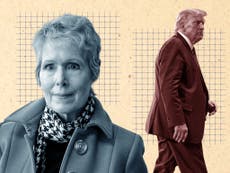The Independent's journalism is supported by our readers. When you purchase through links on our site, we may earn commission.
The lessons we should all be taking from E Jean Carroll’s Trump sexual abuse case
The Carroll v Trump trial provided some surprisingly helpful examples of how we might want to handle rape and sexual abuse cases


Your support helps us to tell the story
From reproductive rights to climate change to Big Tech, The Independent is on the ground when the story is developing. Whether it's investigating the financials of Elon Musk's pro-Trump PAC or producing our latest documentary, 'The A Word', which shines a light on the American women fighting for reproductive rights, we know how important it is to parse out the facts from the messaging.
At such a critical moment in US history, we need reporters on the ground. Your donation allows us to keep sending journalists to speak to both sides of the story.
The Independent is trusted by Americans across the entire political spectrum. And unlike many other quality news outlets, we choose not to lock Americans out of our reporting and analysis with paywalls. We believe quality journalism should be available to everyone, paid for by those who can afford it.
Your support makes all the difference.The verdict in the E Jean Carroll v Donald Trump is in. On Tuesday (9 May), jurors announced they had found Trump liable for sexual abuse and defamation against Carroll. They rejected another claim, for rape, and awarded Carroll $5m in damages.
This is vindication for Carroll, whom Trump has previously called a liar, and who had to face a presumably traumatizing amount of public scrutiny after deciding to take a former president to court. Carroll has alleged that Trump raped her in the 1990s inside a dressing room at the Bergdorf Goodman department store in Manhattan.
When the E Jean Carroll v Donald Trump case opened on 25 April, I braced myself for… well, a lot of ignominy. As someone who has covered other high-profile cases, including Harvey Weinstein’s 2020 criminal trial in New York, I have witnessed firsthand how brutal the criminal justice system can be to survivors of sexual crimes. I have often worried about its inadequacies, and the ways they might deter other survivors from coming forward and fail the ones who decided to do so.
The Carroll v Trump trial, however, provided some surprisingly helpful examples of how we might want to handle rape and sexual abuse cases going forward. Obviously, those cases are always going to involve untold amounts of pain and trauma. Obviously, in an ideal world, those trials would not even be needed, because the wrongs they are designed to right would not exist. But if rape and sexual abuse are going to continue to be prevalent in our world, then, yes, we owe it to ourselves and others to make sure the justice system is equipped to handle them.
The first thing the justice system did in Carroll’s case was allow her to file a complaint at all. Carroll first spoke out in 2019, and filed a lawsuit against Trump in 2019. That particular lawsuit is still making its way through the legal system and has stalled for various reasons – not least of all, the fact that the Department of Justice, in what The New York Times called “a highly unusual legal move”, transferred the case from state to federal court, offering him an array of protections that wouldn’t have been available to him if he’d been sued in an individual capacity.
But Carroll went on to file another suit – the one that led to this latest verdict. She was able to do so thanks to the Adult Survivors Act, a New York State law that gave adult survivors of sexual assault a one-year period of time during which they could file civil lawsuits pertaining to past attacks, regardless of the statute of limitations. The window opened on 23 November 2022 and will close on 23 November 2023, after which statutes of limitations will come into effect again. Carroll, according to The Associated Press, was “one of the first to file” a civil lawsuit as part of the Adult Survivors Act.
A specific piece of legislation, designed with survivors in mind, allowed Carroll to have her day in court. It is a law that recognizes that some people might need time (more time than statutes of limitations allow) before they are ready to take legal action. This is the kind of survivor-centric, empathetic legislation we need more of.
During the actual trial, Trump chose not to be there. I, of course, do not know how Carroll felt about this decision, but Trump’s absence does mean that he did not take the stand. Had he done so, it’s not unreasonable to imagine his testimony would have been callous, and that it might have helped spread some of the harmful myths about rape and sexual assault that frequently get aired in courtrooms.
The trial itself – and in fact, the entire process, from Carroll’s complaint to the verdict – was relatively quick. Carroll filed this civil lawsuit in November 2022. It went to trial on 25 April 2023. Two weeks later, by 9 May, we had a verdict. The trial was not televised. It’s actually kind of miraculous how not a circus this process turned out to be.
Carroll’s own words make clear how vindicating the trial and verdict are from her perspective. “I filed this lawsuit against Donald Trump to clear my name and to get my life back. Today, the world finally knows the truth. This victory is not just for me but for every woman who has suffered because she was not believed,” she said in a released statement, shortly after the verdict was announced. “I would like to express my deep and lasting gratitude to all those who have stood by me from the start, especially my incredible and fearless legal team, led by Robbie Kaplan, who never, ever backed down in pursuit of truth and justice.”
Courtrooms are too often ill-equipped to handle sexual crimes. They can be brutal environments for survivors. This trial gives us crucial clues on how to build a better justice system.



